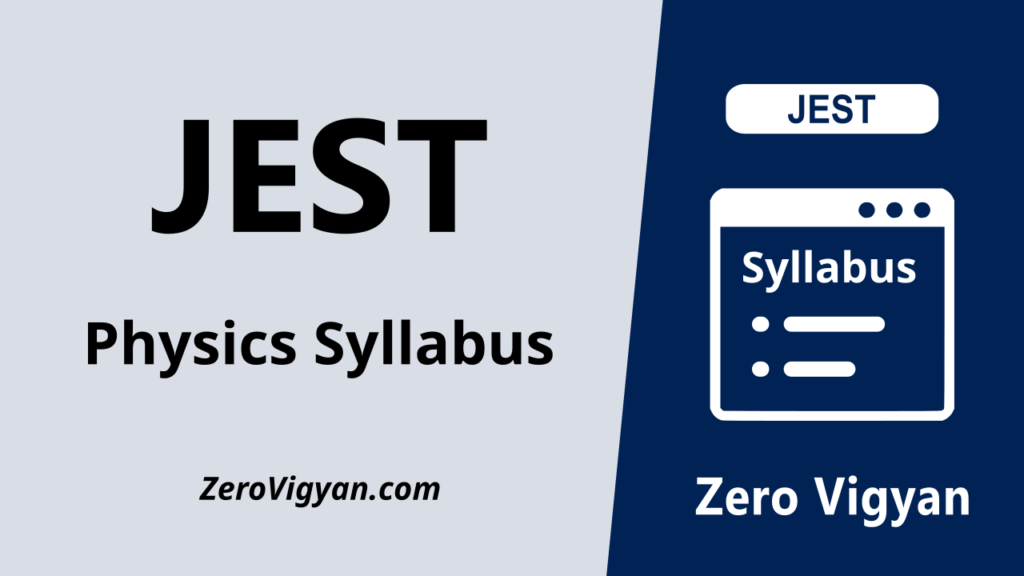
JEST – Joint Entrance Screening Test is a national level examination conducted annually in Physics and Theoretical Computer Science.
The test scores are used by several institutions to shortlist candidates for PhD and Integrated PhD programmes in Theoretical Computer Science and diverse areas related to Physics.
The examination will be at the level of MSc or an advanced BSc in Physics or Computer Science, respectively.
Mode of JEST 2024 Examination
JEST 2024 exam will be conducted online (Computer Based Test).
Pattern of JEST Physics
JEST Paper contains three parts with a total of 100 marks.
- Part A contains 25 questions, and each carries 1 mark for the correct answer, and -1/3 mark for incorrect answer. Multiple choice questions have only one correct answer out of given options.
- Part B contains 15 questions, and carries 3 marks each for correct answer, and -1 mark for incorrect answer.
- Part C contains 10 questions and each carries 3 marks. Answers of these questions are in integers and have to be filled on the OMR by filling in bubbles in the OMR sheet. There are NO NEGATIVE MARKS for these questions.
JEST 2023 (Different Pattern then Previous)
JEST Paper contains two parts with a total of 300 marks.
- Part A contains 25 questions, and each carries 3 mark for the correct answer, and -1/3 mark for incorrect answer. Multiple choice questions have only one correct answer out of given options.
- Part B contains 25 questions, and carries 9 marks each for correct answer, and -3 mark for incorrect answer.
JEST Physics 2024 Syllabus
Mathematical Methods
Vector algebra and vector calculus, tensors, curvilinear coordinate systems, linear algebra; Linear differential equations, elements of Sturm-Liouville theory; Special functions; Complex analysis; Fourier series and Fourier transforms, Laplace transforms; Elementary properties of discrete groups; Elements of probability theory, error analysis.
Classical Mechanics
Newton’s laws, conservation of energy and momentum, collisions; generalized coordinates, principle of least action, Lagrangian and Hamiltonian formulations of mechanics; symmetry and conservation laws; central force problem, Kepler problem; small oscillations and normal modes; special relativity in classical mechanics.
Electromagnetism & Optics
Electrostatics and magnetostatics, boundary value problems, multipole expansion; fields in conducting, dielectric, diamagnetic and paramagnetic media; Faraday’s law and time varying fields; displacement current; Maxwell’s equations; energy and momentum of electromagnetic fields; propagation of plane electromagnetic waves, reflection, refraction; electromagnetic waves in dispersive and conducting media; diffraction, interference, polarization.
Quantum Mechanics
Uncertainty principle; Schrodinger equation; central potentials, hydrogen atom; orbital and spin angular momenta, addition of angular momenta; matrix formulation of quantum theory, unitary transformations, Hermitian operators; variational principle, time independent perturbation theory, time dependent perturbation theory.
Thermodynamics & Statistical Physics
Laws of thermodynamics, work and heat, thermodynamic potentials; Elements of kinetic theory; Maxwell’s relations; statistical ensembles; partition function; classical ideal gas, harmonic oscillators; classical and quantum statistics; Fermi and Bose gases; black body radiation; statistics of paramagnetism.
Electronics
Basics of semiconductor; p-n junctions, diodes, transistors; LCR circuits, rectifiers, amplifiers, active filters and oscillators; basics of OPAMPs and their applications; basics of digital electronics.
Download PDF – JEST Physics Syllabus PDF
